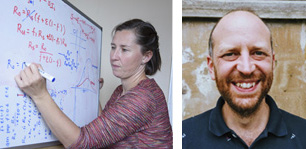
On the mathematical frontline: Ellen Brooks Pollock and Leon Danon
On the mathematical front line is a special series of the Plus podcast featuring epidemiologists whose efforts have been crucial in the fight against the pandemic. They are the people who make sense of the data to estimate things like the R number, and who make the mathematical models that inform (and sometimes do not inform) government policy.

Ellen Brooks Pollock and Leon Danon.
In this episode we talk to Ellen Brooks Pollock and Leon Danon, both from the University of Bristol. The are members of the JUNIPER consortium of modelling groups from across the UK whose research and insights feed into the Scientific Pandemic Influenza Modelling group (otherwise known as SPI-M) and SAGE, the Scientific Advisory Group for Emergencies, both of which advise the UK government on the scientific aspects of the COVID-19 pandemic.
Ellen and Leon are also a couple, who have stuck it out through the lockdowns not just in terms of living arrangements and child care, but also in terms of work. And if you don't live with a partner but instead have benefited from the support bubbles that allowed you to team up with another household, then you have Ellen and Leon to thank for that: as we find out in the podcast, it was their work on household bubbling which showed that these support bubbles were safe.
You can listen to the podcast using the player above, and you can listen and subscribe to our podcast through Apple Podcasts, Spotify and through most other podcast providers via podbean.
The podcast is part of our collaboration with JUNIPER, the Joint UNIversity Pandemic and Epidemic Response modelling consortium. JUNIPER comprises academics from the universities of Cambridge, Warwick, Bristol, Exeter, Oxford, Manchester, and Lancaster, who are using a range of mathematical and statistical techniques to address pressing questions about the control of COVID-19. You can see more content produced with JUNIPER here.
